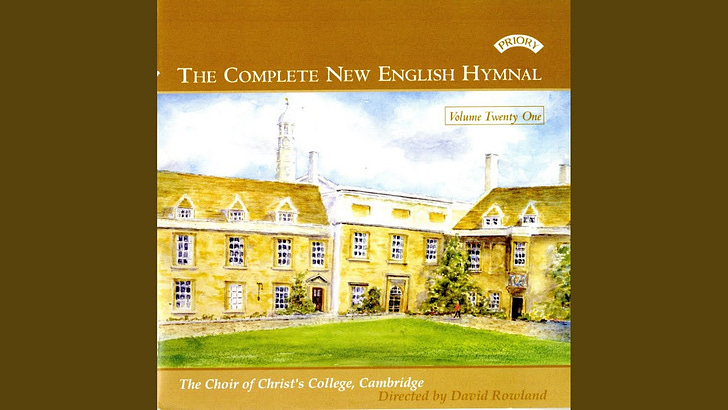You might think it would be hard to turn our Word of the Week, romance, to a hymn — unless you’re steeped in the poetry of the Middle Ages. Every time I say, “Middle Ages,” I hope you’ll think of all the bold and bright color of those high times between about 1000 and 1300, when the weather was warm, the Vikings were growing barley on the coasts of Greenland, the population of Europe doubled, the universities were founded, and international trade and banking began. Or, for some sweeter things, people sang Christmas carols, and a vast and many-sided poetry of love came into being. And it wasn’t as if the monks latched on to some “secular” themes and gave them Christian meanings. There was no such distinction to make; and in any case, poetry and philosophy centering on God’s love for mankind and our love for God, especially centering on the person of Jesus, is right there at the beginning and the heart of it all. It certainly was there in our featured hymnodist this week, perhaps the greatest and most influential European of his century, Saint Bernard of Clairvaux.
Our Hymn of the Week, “Jesus, Thou Joy of Loving Hearts,” is a translation of five stanzas from a long poem attributed to Bernard, though we don’t think he wrote all fifty or so of the stanzas; some seem to have been added later on, in the same spirit and of course with the same meter. The poem’s first line is Jesu, dulcis memoria, which we’ve had here at Word and Song, or rather some other stanzas from it, which Edward Caswall translated as the wonderful hymn, “Jesus, the Very Thought of Thee.” Bernard, the Doctor mellifluus, the honey-flowing Teacher, wrote a great deal about the love of God, and how without that love we can’t ascend to knowledge of the divine. You don’t simply love what you see. You see because you love. It opens your eyes. I recall speaking about this to a group of very happy and bright religious sisters in a rural village in northeastern Pennsylvania. They had asked me to lead them in a discussion of Bernard’s treatise On the Love of God. As I was driving toward their monastery, I saw one of the sisters walking down a country road with an open book, and, thinking about my school days, I said, “Well, this is a first for me! Instead of the sisters checking my homework, I’m checking theirs!” The highest form of love, Bernard says, goes beyond even loving God for God’s sake. It’s when you love yourself for God’s sake: then you do more than gaze in wonder at the beauty of God; you participate, by love, in that divine love that overflows into creation itself, that makes something from nothing, even yourself.
But here in this hymn, the focus is on Jesus and his love, and that too is characteristic of the Middle Ages. Look around you. Everything you see will have its rising and its setting. “Where are the snows of yesteryear?” asked the late medieval poet Francois Villon, sadly. “Eat, drink, and be merry” — that’s not the saying of people who really feel merry inside. It’s a smiling face for people who have resigned. Not Bernard. It’s why, when Dante chooses a guide to lead his namesake to the very presence of God, he turns not to theology but to Bernard, who wrote most powerfully not about what we understand but about what we love.
For today’s hymn, the translator, Ray Palmer, chose five stanzas from the original Latin poem, focusing on what does not change, and on the sweetest of all food and drink, the sacrament of the living bread come down from heaven. Other foods satisfy for a time, and if we eat or drink more of them beyond a certain point, they will no longer even please. The love of Jesus — his love for man, man’s love for him — both satisfies and makes the soul all the hungrier, and that can only be said of love, whose motto is never, “All things in moderation,” but “The more the merrier”!
Jesus, thou joy of loving hearts, Thou Fount of life, thou Light of men, From the best bliss that earth imparts We turn unfilled to thee again. Thy truth unchanged hath ever stood; Thou savest those that on thee call; To them that seek thee, thou art good, To them that find thee, all in all. We taste thee, O thou living Bread, And long to feast upon thee still; We drink of thee, the Fountainhead, And thirst from thee our souls to fill. Our restless spirits yearn for thee, Where'er our changeful lot is cast; Glad, when thy gracious smile we see, Blest, when our faith can hold thee fast. O Jesus, ever with us stay, Make all our moments calm and bright, Chase the dark night of sin away, Shed o'er the world thy holy light.
Our hymn for this week is set to the tune, Eisenach, and beautifully sung by Christ’s College Choir, Cambridge.




This is one of my favorite hymns, though I prefer it sung to the tune “Wareham”. Saint Bernard speaks to my soul.